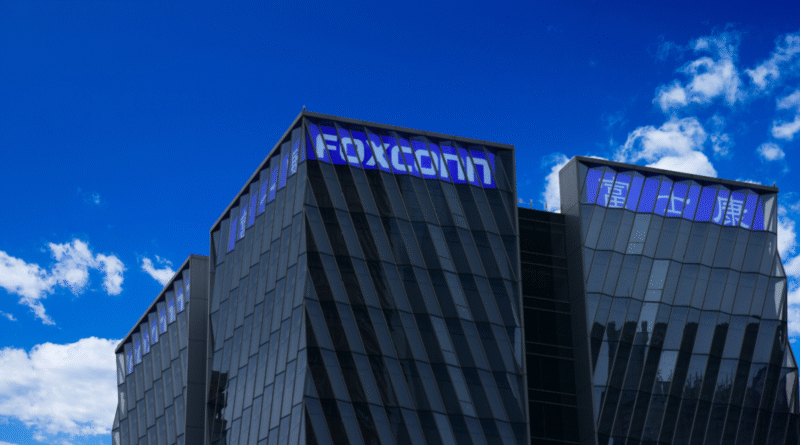Taiwan’s Foxconn to Invest Up to $1.4 Billion in AI Data-Center Equipment — What it Means
Taiwan’s technology manufacturing giant Foxconn (Hon Hai Precision Industry Co., Ltd.) has announced plans to invest up to NT$42 billion (approximately US$1.37–1.4 billion) in equipment for an AI compute cluster and supercomputing center.
The investment, revealed through a company filing, is scheduled between December 2025 and December 2026 and will be funded entirely using Foxconn’s own capital. This move aligns with Foxconn’s strategic shift from traditional electronics manufacturing toward AI infrastructure, data centers, and smart cloud computing services.
Key Highlights
- 💰 Investment Size: Up to NT$42 billion (US$1.37–1.4 billion)
- 🗓️ Timeline: December 2025 – December 2026
- 🏗️ Purpose: Build AI compute clusters and supercomputing centers
- 🏦 Funding Source: Company’s internal funds (no external borrowing)
- 📍 Location: Taiwan (exact site not disclosed)
- 🤝 Partnerships: Ongoing collaborations with Nvidia and TECO Electric & Machinery
Why Foxconn is Investing in AI Infrastructure
1. Diversification Beyond Smartphones
Foxconn is the world’s largest electronics contract manufacturer, assembling products for Apple, Dell, and other global tech brands. However, its core business faces tight margins and cyclical demand.
The new investment allows Foxconn to enter higher-value AI and data-center segments, creating a foundation for long-term growth.
2. Building the AI Hardware Backbone
As AI and generative computing demand skyrockets globally, the need for high-performance GPUs, networking, and cloud infrastructure is expanding.
Foxconn’s expertise in large-scale hardware manufacturing gives it a unique edge to produce and manage AI-ready data centers.
3. Strengthening Taiwan’s Role in AI Supply Chains
By building the infrastructure domestically, Foxconn supports Taiwan’s positioning as an AI technology hub, complementing the nation’s semiconductor leadership (led by TSMC).
Local data-center capacity also benefits startups, AI research institutions, and enterprise users seeking compute resources within Asia.
Technical & Strategic Implications
1. Scale of Infrastructure
Although Foxconn hasn’t disclosed exact capacity, industry analysts suggest the project could involve 100 megawatts (MW) of power — comparable to hyperscale AI centers in the U.S. and China.
Such a center could host tens of thousands of AI accelerators (like Nvidia H100s) to power training and inference workloads for large-language models, robotics, and edge AI services.
2. Advanced Cooling & Energy Efficiency
AI compute facilities generate massive heat loads. Foxconn’s centers will likely deploy liquid-cooling and high-density power solutions, supported by advanced grid connections and redundancy systems to ensure uptime and sustainability.
3. Integration With Foxconn’s Smart Platforms
The company aims to integrate its AI compute clusters with smart manufacturing, EV, and robotics platforms, enabling data-driven automation across its factories and products.
Recent Related Developments
- ⚙️ Partnership with Nvidia: Foxconn previously announced plans with Nvidia to co-develop “AI factories” — data centers capable of running and training large AI models.
- 🔌 Collaboration with TECO: Foxconn teamed up with TECO Electric & Machinery to build next-generation AI data-center projects in Taiwan.
- 🌐 Global Expansion: Foxconn is also building data-center equipment facilities in the U.S. and exploring partnerships in India and Southeast Asia to support AI infrastructure needs.
Market Impact
1. Boost for AI Hardware Vendors
This billion-dollar procurement will translate into major GPU and server orders for Nvidia, AMD, and other component suppliers — strengthening the AI hardware supply chain.
2. New Growth Avenue for Foxconn
While smartphone manufacturing remains Foxconn’s backbone, its transition into AI infrastructure could open recurring revenue streams from data-center operations and AI-as-a-Service offerings.
3. Taiwan’s AI Ecosystem Gains Momentum
Large domestic investments from Foxconn will attract talent, startups, and enterprise customers, bolstering Taiwan’s role as a regional AI powerhouse.
Potential Challenges
- ⚠️ Supply Constraints: Global GPU shortages could delay equipment delivery.
- ⚠️ Energy Demand: Securing stable 100 MW-class power supply may face local regulatory or grid limitations.
- ⚠️ Market Volatility: Rapid shifts in AI trends and infrastructure costs could impact return on investment.
Conclusion
Foxconn’s decision to invest NT$42 billion (US$1.4 billion) in AI data-center equipment is a defining step in its transformation journey.
The project positions Foxconn at the heart of the AI infrastructure boom, aligning its manufacturing might with the world’s growing demand for compute power.
If executed effectively, this investment could mark Foxconn’s evolution from a contract electronics maker into a global AI and cloud-infrastructure powerhouse — solidifying Taiwan’s place in the next era of artificial intelligence.
Keep Reading:
- Billionaire Kwek Leng Beng’s CDL Sells 84% of Zyon Grand Towers as Singapore Market Heats Up
- Comet vs Google Chrome: Which Browser Wins in 2025?
- Tata Capital IPO 2025: To Raise $1.7 Billion in India’s Biggest Listing of the Year
- Filament Secures $10.7M Seed Funding to Launch Private, Invite-Only Professional Networking Platform
- Anthropic Hits $170B Valuation After $13B Funding Round




